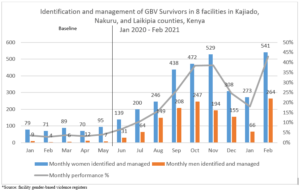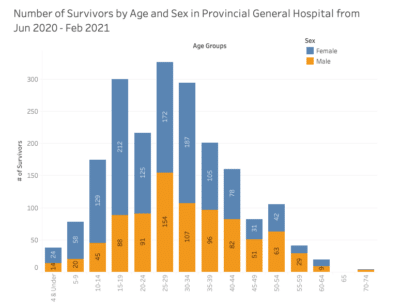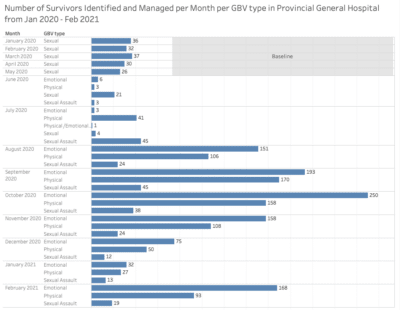Health worker efforts to improve GBV case management in Kenya
By: Hayley Hoaglund, MPH/MBA candidate at JHU and a WI-HER Intern
Gender-based violence (GBV) affects millions of women and men worldwide. In Kenya, its implications are long lasting and devastating, as physical violence affects 49% of girls and 48% of boys aged 13-17 years, and sexual violence affects 11% of girls and 4% of boys, according to Brookings. Especially during the COVID-19 pandemic, domestic violence has been exacerbated through stay-at-home orders. These numbers are underreported due to the fear and stigma that often accompanies violence. GBV poses a substantial threat to the growth and prosperity of adolescents and children, and in recognizing this, WI-HER, through the USAID funded Afya Nyota ya Bonde Project, applied WI-HER’s innovative iDARE methodology to improve the identification and management of cases through survivor centered care models.
 In honor of World Health Worker week, we want to celebrate the health workers championing improvement efforts, who formed iDARE teams, and set targets that helped support the advancements of GBV management in Kenya. Significant progress was made in the identification and management of not only sexual violence, but other forms of violence including, but not limited to, emotional, physical, and economical. Through direct capacity building, coaching, and application of the iDARE (identify, design, apply & assess, record, expand & scale) methodology, facilities cumulatively reported a 45% increase in case management across all age groups.
In honor of World Health Worker week, we want to celebrate the health workers championing improvement efforts, who formed iDARE teams, and set targets that helped support the advancements of GBV management in Kenya. Significant progress was made in the identification and management of not only sexual violence, but other forms of violence including, but not limited to, emotional, physical, and economical. Through direct capacity building, coaching, and application of the iDARE (identify, design, apply & assess, record, expand & scale) methodology, facilities cumulatively reported a 45% increase in case management across all age groups.

Provincial General Hospital (PGH) in Nakuru County, and their iDARE team members Samuel Kioko (team lead), Rose Masita, Frankline Pius, and Naom Omache, had an average increase of 57% of cases identified and managed, exceeding 100% of their target on 10 different occasions.
Ages 15-30 showed the highest prevalence of GBV in both male and female survivors, highlighting PGH’s commitment to the prosperity of young adults in Nakuru county.
During the baseline period (January to May 2020), sexual gender-based violence (SGBV) was the only form of violence identified and managed at the eight facilities, with mainly female survivors identified and managed for SGBV. Through continuous coaching on iDARE, and WI-HER’s support in expanding national GBV tools to meet international standards, facilities have been able to expand their identification and support beyond only SGBV. Since the start of the application of iDARE at the eight facilities, we have seen a dramatic increase in identification and reporting of the three other forms of GBV. Notably, the identification and management of emotional violence superseded SGBV (June 2020- February 2021).
 The health workers in Kenya are continuously applying iDARE to improve GBV identification and response, assessing barriers and testing solutions within their respective facilities to improve survivor centered care. Solutions included training all facility healthcare workers on GBV, its implications and characteristics, streamlining reporting, and engaging community health workers in case identification. Not only did staff facilitate survivor centered care within their facilities, but they also included local law enforcement and lawyers to provide a continuum of support and protection for their patients.
The health workers in Kenya are continuously applying iDARE to improve GBV identification and response, assessing barriers and testing solutions within their respective facilities to improve survivor centered care. Solutions included training all facility healthcare workers on GBV, its implications and characteristics, streamlining reporting, and engaging community health workers in case identification. Not only did staff facilitate survivor centered care within their facilities, but they also included local law enforcement and lawyers to provide a continuum of support and protection for their patients.
We want to congratulate all of the empowered and motivated health care workers in Kenya and globally that are tirelessly working to support survivors of violence, even during the challenging ongoing pandemic. Thank you for your dedication and commitment to survivor centered care, happy world health worker week!